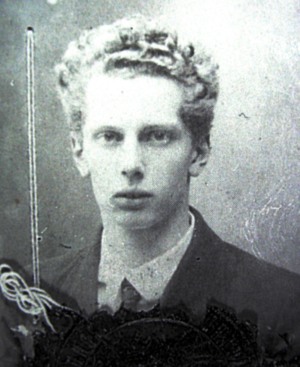.jpg) Newchwang was a Treaty Port created in 1858. In Blacher's time, Newchwang was a godforsaken little town on a river that froze up all winter. Sometimes the sea froze too. In summer, it's extremely hot, not at all an easy climate. Bear this in mind when considering the film Flüchtlinge (Refugees) made in 1933, based on a novel by Gerhard Menzel (1894-1965). Menzel was a Nazi so the nationalism in the film is tainted, even though the film itself isn't much more jingoistic than a lot that was happening at this early stage in the Reich. The star, Hans Albers, the biggest star of his time, was not a party follower and in any case had a Jewish partner, who had to flee to Switzerland, though they reunited after the war. The director was Gustav Ucicky (1899-1961) the half-Czech illegitimate son of Gustav Klimt.
Newchwang was a Treaty Port created in 1858. In Blacher's time, Newchwang was a godforsaken little town on a river that froze up all winter. Sometimes the sea froze too. In summer, it's extremely hot, not at all an easy climate. Bear this in mind when considering the film Flüchtlinge (Refugees) made in 1933, based on a novel by Gerhard Menzel (1894-1965). Menzel was a Nazi so the nationalism in the film is tainted, even though the film itself isn't much more jingoistic than a lot that was happening at this early stage in the Reich. The star, Hans Albers, the biggest star of his time, was not a party follower and in any case had a Jewish partner, who had to flee to Switzerland, though they reunited after the war. The director was Gustav Ucicky (1899-1961) the half-Czech illegitimate son of Gustav Klimt.In any case. the situation the movie depicts was so extreme that it would have merited similarly nationalistic sentiment had it happened elsewhere. The photo at right shows Newchwang a year after Blacher's birth. Click to enlarge - it's very detailed. "Abandoned Newchwang", conquered by crack Russian troops, fighting Manchu bannerman. No contest. The Russians had already seized northern Manchuria, and had built a railway line through the province, to extract its mineral wealth. Soon after, Russia and Japan went to war, and the devastation spread, culminating in huge naval battles and the siege of Port Arthur, itself the site of a massacre ten years before when the Japanese wiped out the Chinese population. Thus, the background to the Japanese invasion of China 25 years later and the War in the Pacific. Matters were compounded with the Bolshevik revolution in 1917, when millions of "White" (ie not Red) Russians fled across Siberia to Manchuria, from part of which the Japanese had evicted the Russians.
The film Flüchtlinge begins in August 1928. Everyone's fleeing the return of the Russians - Chinese, Russians, Jews and Volga Deutsch, the German population on the Volga that the Reds wanted rid of. Some of the cast are East Asian of some sort : one of them speaks proper Mandarin and rattles off his German text as if he's memorized it off paper. Yingkou (Newchwang) is mentioned specifically, but most are trying to get to Harbin, further north, where the Russian-built railway can take them away. That was the city from which young Blacher left for Germany six years before, when this branch of the railway was run by Whites, Japanese and Chinese.
The refugees are caught in machine-gun fire, and some of the men are dragged away screaming by Bolshevik soldiers. They're also dying of thirst, so break the pipes on the trains to get the water that runs the steam engines. Without water, though, the trains won't run. Hans Albers plays Arneth, who at first appears as a sadistic Englishman, but turns out to be a German, who felt betrayed by the 1918 revolution in Germany and by what happened after. As many did. Whence Hitler. Will Arneth betray the refugees or help them ? He chooses the latter. Eventually the train gets going, though the tracks are twisted and a grain silo gets holed by grenades. It would be easy to dismiss Flüchtlinge as propaganda, but such events did take place and to real people all over the world in some form or other. Please also see my piece Art Song that became an Icon : On the Songhua River, which some might sneer at because it's communist, while Flüchtlinge is early Nazi. Incidentally, they're both about the same part of Manchuria. What matters isn't nationality but human beings, whether they are on "our side" or not. Did Blacher see these movies ? Chances are he would have known about Flüchtlinge through the China-returned German community. On the Songhua River was heavily promoted in East Berlin. and the DDR. Chances are he did. Did he realize he was seeing them through different perspectives ?


No comments:
Post a Comment